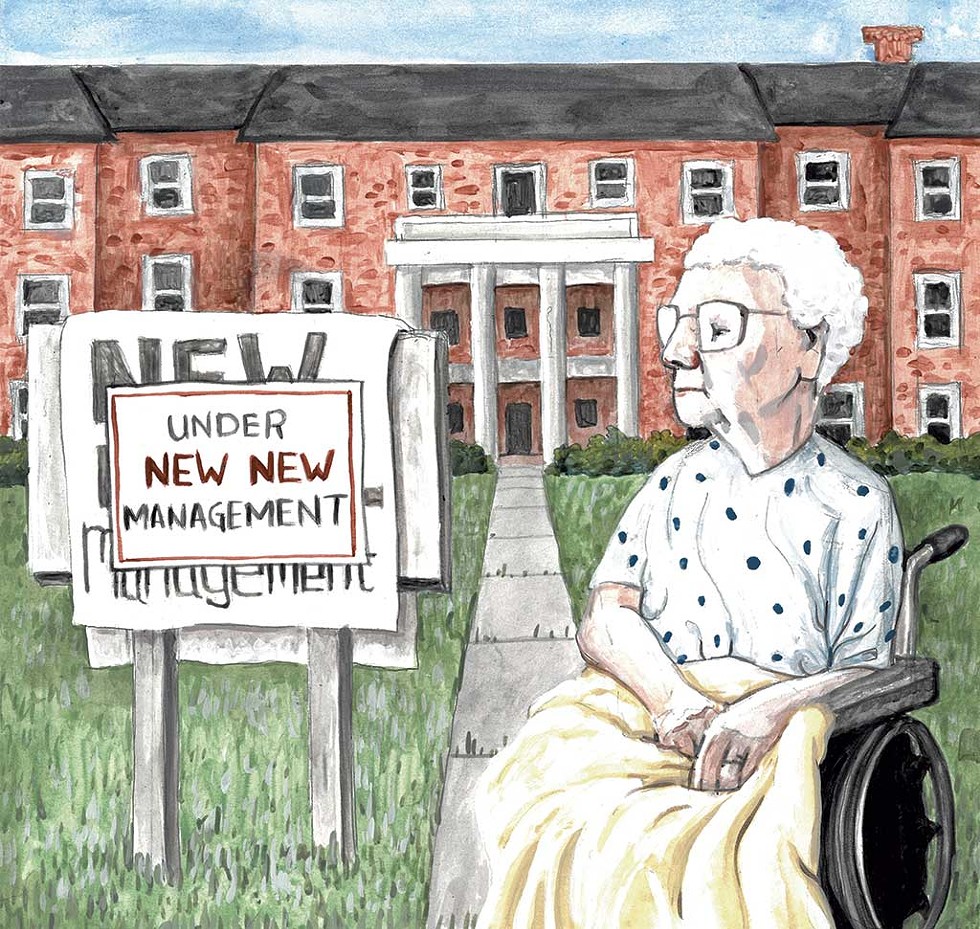
- Matt Morris
In the years leading up to the pandemic, a suburban Pittsburgh nursing home allegedly kept phony records to trick regulators into thinking it met state and federal staffing requirements.
Pennsylvania officials indicted the home's administrator, Susan Gilbert, in February and suggested more indictments would follow. The home, Mt. Lebanon Rehabilitation and Wellness Center, shared ownership with another facility one county over, Brighton Rehabilitation and Wellness Center, where COVID-19 had killed more than 70 people in a widely publicized catastrophe. State and federal investigators are looking into Brighton, too.
"Today's indictment is just one piece of a larger puzzle," the state's attorney general told the Pittsburgh Post-Gazette.
That jigsaw has implications for the future of nursing home care in the Green Mountain State. A leader of the companies at the center of the Pennsylvania probe is closely linked to a three-person group that is seeking to buy five homes that hold more than 500 of Vermont's 2,900 nursing home beds, Seven Days has learned.
Last fall, two members of the group began managing the homes — Burlington Health & Rehab and similarly named homes in Bennington, Berlin, Springfield and St. Johnsbury — through a contract with their current owner, Genesis Healthcare, a corporate Goliath. Now they are awaiting state regulators' permission to purchase the facilities outright.
Their Vermont enterprise appears to be one node in a fast-growing nursing home network based in New York City that has continued to scoop up distressed homes during the pandemic, even as residents and staff have grappled with brutal COVID-19 outbreaks.
It is hard to decipher where the empire begins and ends, thanks to an intricate web of corporate structures that can obscure who is profiting from the taxpayer-funded homes and who is responsible for lapses in care.
A case in point: An owner of the embattled western Pennsylvania homes, Ephram "Mordy" Lahasky, appears on loan documents related to the pending Vermont purchase, an application submitted to state regulators shows. He is not, however, listed as a would-be owner — but his wife is.
Since he's not listed as a buyer, Lahasky's sprawling long-term care holdings — and his companies' mounting legal troubles — are not included on the application for the state to review.
Neither Lahasky, the buyers, nor their Vermont attorney responded to interview requests or written questions. In their application to purchase the homes, submitted in February, the buyers asserted that much of the document should be exempt from public inspection. The state initially accepted their position and denied Seven Days the records, then released more than 700 partially redacted pages of the application after the newspaper appealed that decision.
The newspaper used those records, federal nursing home data, legal filings, news reports and other documents to piece together a fuller picture of the would-be buyers than has been previously known.
Eldercare advocates say the need to hold nursing home operators accountable is especially urgent in light of COVID-19, which killed more than 130 long-term care residents in Vermont alone and exacerbated staffing shortages. "We can't ignore the chronic and ongoing problems in nursing homes that the pandemic exposed," said AARP Vermont director Greg Marchildon.
State law gives officials the power to review nursing home sales and block purchases by buyers who are financially or otherwise unfit. For years, the task fell to the Green Mountain Care Board through its "certificate of need" process, which included a public hearing.
But the state's review of the latest deal is hobbled because lawmakers haven't followed through on a 2019 plan to reform the process. The Agency of Human Services, which is now tasked with reviewing such sales, is limited by a lingering set of "interim" rules and lacks a dedicated staff to assess the application. And, unlike in the old process, the public is given no opportunity to review the applications or weigh in on the sales.
The final decision rests solely with Human Services Secretary Mike Smith.
"When push comes to shove," Vermont's long-term care ombudsman Sean Londergan said, the state is "in a tough position to reject an applicant that demonstrates that they have the financial backing to run this business."
The would-be buyers already are running the business. Outside Burlington Health & Rehab, the red Genesis sign has been covered over by a purple and gold banner. A placeholder website and Facebook page already announces a new name: "Queen City Nursing and Rehabilitation."
But the facility has still struggled to provide quality care, a state inspection from February indicates. At that time, residents told inspectors that critically short staffing levels meant they went weeks without showers or clean sheets. Medications weren't administered on time, and food was cold by the time it got to residents' rooms. One resident, according to an inspector's notes, feared using a bedpan because no one would return to remove it.
"This place is so bad for me," the resident said through tears. "It's so bad for my mental health."
Bought and sold
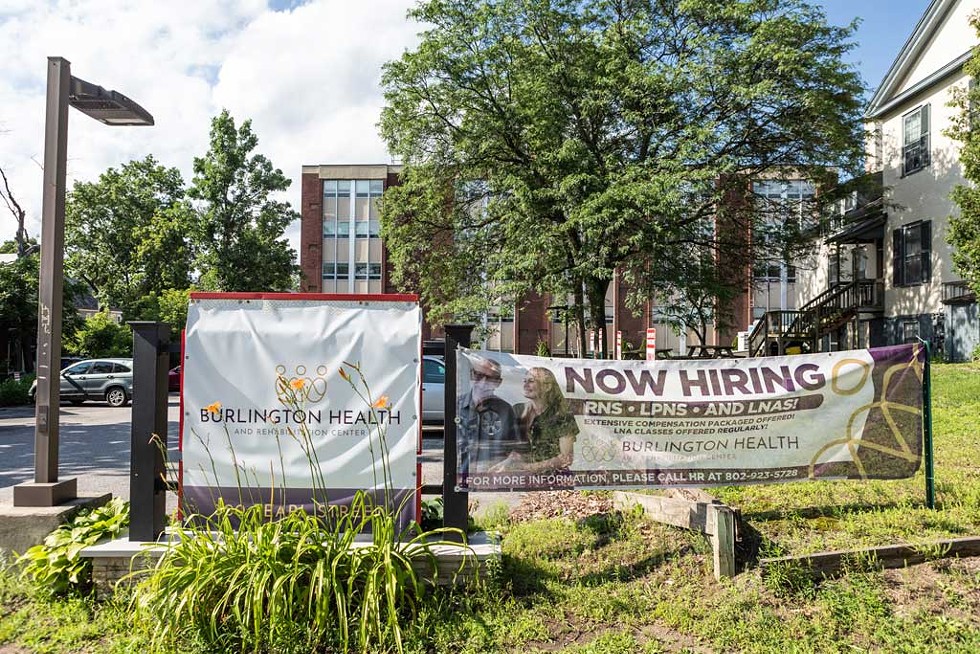
- Luke Awtry
- Burlington Health & Rehab
In 2016, Genesis Healthcare bought five of Vermont's largest nursing homes from a Canadian corporation that was looking to sell off its portfolio. The price: $39 million.
The facilities were not among the state's finest. Two had one-star ratings on a federal five-star quality scale.
Residents' care did not appear to improve under Genesis. In early 2020, the company paid $740,000 to settle claims by the Vermont Attorney General's Office that corporate neglect led to serious injuries at its Burlington, St. Johnsbury and Berlin homes, and to a resident death at Burlington Health & Rehab. The homes had one- and two-star ratings at the time.
Months later, Genesis, under financial pressure during the pandemic, reached an agreement to sell the homes it had bought in 2016. The purchase price has not been disclosed, but a lender for the buyers published a press release last December saying it had provided them more than $44 million to acquire five Vermont homes.
Research has shown that chain-owned nursing homes are frequently bought and sold, and that ownership changes don't tend to improve the quality of care.
The group that proposes to buy the five Genesis homes is not organized under one corporate banner. Each home would be separately owned in equal parts by the same three individuals, according to the application filed with the state: David Gamzeh, Akiva Glatzer and Akiko Ike.
Gamzeh and Glatzer are licensed nursing home administrators who have managed individual homes in New York City. In 2015, they began acquiring ownership stakes in homes throughout the Northeast and as far away as Oklahoma and Michigan, Centers for Medicare & Medicaid Services data show. They also formed a management company, Priority Healthcare Group, that provides "administrative consulting" to many of the homes for a fee.
The pair already have a foothold in Vermont. They joined with four other investors, including Lahasky, in 2016 to purchase and operate what is now called Barre Gardens for $6.6 million as part of a multistate deal. The same year, the group filed applications to purchase four locally owned nursing homes in the Northeast Kingdom but later withdrew them for undisclosed reasons.
Gamzeh and Glatzer currently own shares together in more than 30 nursing homes in at least eight states, according to federal ownership data. Many are branded in similar ways. The website for Barre Gardens, for instance, uses identical promotional photos as the website for the Gardens at Stevens in south-central Pennsylvania; neither website mentions Priority Healthcare Group or the facility's owners.
Their largest acquisitions have been in Pennsylvania, where they bought into more than 25 homes over a two-year period, mostly from companies that were failing or facing lawsuits from the state, an investigation by the Patriot-News, a Harrisburg, Pa., newspaper, found.
The newspaper analyzed inspection records and found that many of the Priority-run homes had not improved under new management. One of the facilities, the Gardens at West Shore in Camp Hill, Pa., has racked up more than $120,000 in state and federal fines since Gamzeh and Glatzer took it over in 2016. A pending civil lawsuit against the home involves a 76-year-old woman who developed a severe pressure ulcer while residing there to recover from surgery. She died of sepsis at a hospital.
Gamzeh and Glatzer acknowledge in their pending Vermont application that the Pennsylvania homes have been among their "most challenging." The homes were troubled at the time of purchase, they wrote, and "it can take years to turn them around."
In the meantime, they have continued to expand their holdings. Just as they assumed management of the five Genesis homes in Vermont last fall, Gamzeh and Glatzer inked a deal for several others in Indiana. That same month, a COVID-19 outbreak began inside the Gardens at Stevens in Pennsylvania. The virus killed at least 34 residents in the 82-bed facility, Pennsylvania state data show.
Several families of outbreak victims have subpoenaed the home for records in advance of possible litigation.
"I would not want one of my loved ones in a building owned by this group," said their attorney, Marty Kardon.
Gamzeh and Glatzer have been selling homes, too. As part of their application to buy Barre Gardens, they each disclosed 14.5 percent ownership interests in a pair of one-star Minnesota facilities they acquired in 2016. As of January, the facilities were owned by a man named George Katz, according to federal records. Both homes have new names and are still rated one star.
Wider web

The rapid growth of Gamzeh's and Glatzer's holdings has been inextricably linked to Lahasky and his other business partners, Seven Days found.
Lahasky or a Lahasky-affiliated LLC is listed as a coinvestor in every nursing home in which Gamzeh and Glatzer own shares, including Barre Gardens, according to federal ownership data. Another New York City man, Joshua Farkovits, holds shares in nearly all of the homes, as well.
Lahasky's nursing home business is extensive: He owns stakes in more than 100 homes across numerous states.
Lahasky "turns around distressed nursing homes," he wrote in a one-page résumé filed with the State of Vermont in 2016 as part of the since-withdrawn purchase application. Recently, he has begun buying homes through an organization called MED Healthcare Partners.
MED, according to a March press release, uses regional "partner management companies," including Gamzeh and Glatzer's Priority Healthcare Group, to manage and operate more than 150 nursing homes in 20 states "under one umbrella." Each regional management group also gets a slice of the ownership.
"By structuring our enterprise in a way in which management are our equity partners, we are able to unify clinical and financial goals from the top down and expedite our turnaround plans," the press release states.
Such complex ownership arrangements are increasingly common in the for-profit nursing home industry, experts say. The federal government requires nursing homes to disclose their owners, but the information is not audited, said Charlene Harrington, professor emeritus at the University of California, San Francisco and a longtime researcher and critic of corporate nursing home operators. As a result, it can be difficult or impossible to understand how various homes are interconnected, who profits from them and by how much.
A corporate diagram filed in a 2017 civil lawsuit provides insight into how a large transaction involving Lahasky, Farkovits, Gamzeh, Glatzer and others was structured. The buyers divided ownership of 18 Pennsylvania nursing homes they purchased in 2016 among at least 10 business partners.
The holdings were first split into two groups: "Comprehensive" homes and "Priority" homes. Each home was then split into two LLCs — one for the property and one for the operations.
Gamzeh and Glatzer had small personal ownership stakes only in the 11 "Priority" homes. Lahasky and Farkovits had larger shares in all 18 homes, as did another well-known nursing home operator and investor: Benjamin Landa.
Landa cofounded a nursing home chain, SentosaCare, that for a time was the largest nursing home network in New York State. A 2015 investigation by nonprofit news outlet ProPublica examined how lax state oversight of nursing home ownership transfers enabled Landa to grow his holdings despite a history of "repeat fines, violations and complaints for deficient care."
Landa sued the reporters for libel. (He lost.)
In 2019, a federal judge concluded that Sentosa violated human trafficking law by recruiting more than 200 nurses from the Philippines to work at Landa's homes and, among other things, threatening to impose a $25,000 contract-termination penalty on those who quit. The judge found Landa personally liable for damages. The parties are finalizing an agreement over the amount to be paid, court records say.
Mark Weiss, who described himself as a media relations consultant for Landa, told Seven Days that Landa's ownership stake in the Pennsylvania homes he owns with Lahasky is "purely a financial arrangement" and that he is not involved in any management decisions.
"Ben is a passive investor in an entity which itself is a passive investor and a minority company in a holding company that owns several nursing homes in Pennsylvania," Weiss said.
Disaster at Brighton

- Andrew Rush/Pittsburgh Post-Gazette
- Members of the Pennsylvania National Guard arriving at Brighton Rehabilitation and Wellness Center in May 2020
Lahasky, working with other business partners who are not part of the Vermont deal, owns and operates a string of homes in Pennsylvania under a company called Comprehensive Healthcare Management Services, which is listed among MED's regional partners. One of the first homes they took over, Brighton Rehab and Wellness, was a massive county-run facility that was losing money.
"We are going to kill ourselves to make this a premiere [sic] nursing home," Lahasky told the Pittsburgh Post-Gazette in 2013.
By 2020, Brighton was on a federal list of worst-performing homes nationwide. It also became the site of one of the deadlier COVID-19 outbreaks nationwide, with National Guard troops and temporary managers called in to help. More than 560 residents and staff were infected, and at least 77 residents died, Pennsylvania state data show.
State and federal prosecutors opened criminal probes last summer, and families of residents and an employee who died filed civil lawsuits.
One complaint filed by 15 families accuses Comprehensive Healthcare of negligence and wrongful death. Their Pittsburgh-based attorneys further allege, based on their analysis of federal staffing and patient data, that the home did not have enough caregivers to meet their patients' needs.
"They were systematically understaffed by a fairly dramatic margin for what they reported as to how sick their residents were," attorney Bob Daley said.
Comprehensive has denied the families' allegations and is seeking to have their claims tossed under the federal Public Readiness and Emergency Preparedness Act, which nursing homes argue exempts them from civil liability for their COVID-19 response.
Even before COVID-19, the Pennsylvania homes under Comprehensive's purview, including Brighton, were facing questions over their labor practices. The U.S. Department of Labor brought legal action against Comprehensive in 2018, alleging that the network of companies "consistently" schemed to avoid paying overtime.
Lawyers for the homes contended in court filings that the issue was a "software problem." They also argued that the homes were independent employers, so a caregiver who worked 25 hours at one home and 30 hours at another during the same week need not be paid overtime rates. The case is ongoing.
The federal criminal indictment in February of Gilbert, the administrator at the Mt. Lebanon location, alleged illegal bookkeeping. Gilbert and unnamed coconspirators, prosecutors say, directed employees to falsify records to make it appear that the home had more staff than it did. The alleged fraud took place between 2018 and February 2020. Gilbert has pleaded not guilty.
Lahasky, who had avoided reporters for months, wrote an impassioned op-ed in the Pittsburgh Post-Gazette earlier this year that addressed the criminal investigation. The feds were unfairly targeting Comprehensive because of the high-profile outbreak at Brighton, he wrote, which he noted was not the deadliest in the state.
"The federal government, I believe, has made false claims and failed to request documentation we have meticulously kept throughout this extremely difficult time," he wrote. "That the federal government is attempting to link anything from the past to the outbreak in 2020 is completely irresponsible and wrong."
Lahasky continued: "The U.S. attorney's office intends to indict my employees for failing to contain a virus that devastated the entire industry, our country and the world. It is not right, and I will not stand quietly by while this happens."
The third buyer
Anyone who wants to buy a nursing home in Vermont must provide the state with certain information about themselves and their businesses, such as résumés, financial records, a list of other homes they own and an inspection history for each.
They also must answer a series of questions, such as whether they are under investigation anywhere for fraud.
Yet none of the information about Brighton Rehab or Comprehensive Healthcare is disclosed on the ownership transfer application that Gamzeh, Glatzer and Ike submitted in February.
That's because Lahasky isn't technically a buyer, even though his name appears on a letter from the buyers' lender, Oxford Finance, that they included as proof of financing for the purchase. The letter, obtained through a public records request, identified Lahasky, Gamzeh and Glatzer as the three principal buyers.
But the application itself lists Lahasky's wife, Ike, as the third buyer.
In March, Agency of Human Services staff attorney Todd Daloz asked the buyers' Burlington-based attorney, Shireen Hart of Primmer Piper Eggleston & Cramer, to clarify Lahasky's involvement in the deal.
In an emailed reply, Hart said that Lahasky originally planned to be one of the buyers.
"However, due to a problem with an out-of-state facility in which Mr. Lahasky owns a ten percent (10%) minority interest, and has nominal involvement in the operations of said facility, he made the decision to withdraw from this transaction to focus more immediately on the out-of-state matter," she wrote, adding that "Mr. Lahasky is not alleged of any wrongdoing."
Lahasky owns a 10 percent stake in Brighton Rehab, according to federal records.
When he stepped away from the deal, his wife "offered" to replace him, Hart wrote, while Lahasky remained a loan guarantor.
The Vermont homes would not be the first Ike has owned; she's also acquired partial ownership of eight homes in Minnesota, Pennsylvania and New Jersey since 2018, according to the application.
Harrington, the researcher and ownership transparency advocate, said that nursing home magnates' relatives have a history of standing in as purchasers, and she is skeptical of the practice. But it's hard for states to prove that these arrangements aren't legitimate, she added.
It's unclear what Vermont officials make of the proposed arrangement, though they have sought to clarify Lahasky's role. Daloz declined to comment on the application, saying it would be inappropriate to discuss its merits before the agency renders a decision, which is still weeks or months away.
The issues in western Pennsylvania aren't the only pieces of the bigger ownership picture absent from the application.
One of the homes Glatzer, Gamzeh and Lahasky bought together in 2016, Waterbury Gardens in Waterbury, Conn., has been in court-ordered receivership since November 2019. In its petition to the court, the State of Connecticut wrote that the owners claimed to be "in imminent danger of not being able to afford payroll." The owners said the home was in financial distress because the state reduced its Medicaid payment rate, according to local news reports.
Yet Waterbury Gardens does not appear on the list of homes Gamzeh and Glatzer submitted to the state, nor anywhere on the portions of the February application that were provided to Seven Days.
In the interim
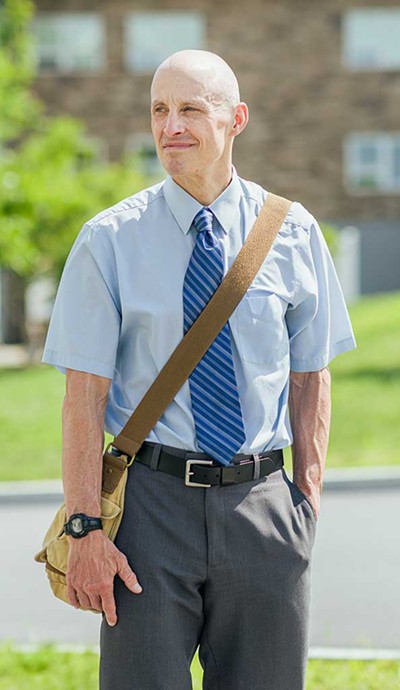
- Oliver Parini
- Sean Londergan
In 2018, Vermont officials knew they needed to keep up with the increasingly sophisticated nursing home industry. Ownership transfers for years had been handled by the Green Mountain Care Board, which decided whether or not to issue certificates of need.
The process wasn't ideal, in part because board members weren't experts on nursing homes. Lawmakers passed Act 125, which formed a working group to devise a better approach. In the meantime, they placed nursing home transfers under an interim process within the Agency of Human Services.
Working group members submitted their recommendations for a permanent system in January 2019. Their report called for a two-part process: a financial review overseen by the Department of Vermont Health Access, and a new, "enhanced" licensure process under the Department of Disabilities, Aging and Independent Living, which already inspects and licenses homes.
The proposed licensure process would "provide a deeper examination of factors that may influence quality outcomes to residents at the time of a change in ownership," the group wrote.
The new system would require an additional full-time position in DAIL, as well as some statutory changes to grant the department broader authority, the working group wrote.
More than two years later, the proposal remains on the shelf.
State Rep. Theresa Wood (D-Waterbury), vice chair of the House Committee on Human Services, said that lawmakers have been focused recently on pandemic-related legislation.
"It is something that has been on our radar screen," she said, "but there, honestly, have been more pressing matters." Wood said she expects her committee will take up the proposal when the legislature reconvenes next year.
Under the interim process, Agency of Human Services staffers are charged with reviewing buyers' ability to operate homes "in a manner that will provide high-quality services and a safe and stable environment for nursing home residents."
Gamzeh, Glatzer and Ike's application is the largest to go through the temporary process, officials said.
Londergan, the long-term care ombudsman who was a member of the working group, said the proposed process would have provided state officials with broader authority and more resources.
"It probably isn't the best that we're doing this big sale, and it's under this interim process that wasn't expected to be in place for this long," he said.
Human Services staff attorney Daloz said the process has been "an added element of work for a lot of our folks, but given the importance of these facilities for Vermont, people take it very seriously."
Their work is effectively behind closed doors. Unlike the old certificate of need process, there's no public hearing on applications, and the documents are not published online.
One feature of the proposed process would allow DAIL to attach conditions, such as independent quality monitoring, when licensing a new operator.
Such monitoring is also a piece of the settlement between the state and the current owner, Genesis, regarding three of the five homes. The provision, which requires the homes to pay for an independent quality of care reviewer and patient care coordinator for up to three years, would continue under the new operators if the deal goes through, the application states.
The proposed buyers have pointed to their existing holding in Vermont, Barre Gardens, as evidence of their ability to successfully turn around homes. Formerly known as Rowan Court, the home spent time on a federal list of struggling "special focus facilities." Glatzer, on his résumé, noted that he transitioned "a special focus facility in Vermont ... into a 5 star building."
"This was accomplished through investing in quality leaders and staff as well as through diligence and education," he wrote.
Barre Gardens is currently rated two stars, which the applicants wrote would improve as old scores cycle out of the ratings formula.
The home had its last annual recertification inspection in February 2020, just before the pandemic. Inspectors cited the home for having too few nursing staff, including shifts where only three or four nursing assistants were tasked to a floor of 48 high-needs residents.
As a result, one of the assistants told a state inspector, the residents "don't get quality care."
Correction, July 21, 2021: Due to an editing error, an earlier version of this story misidentified attorney Todd Daloz.


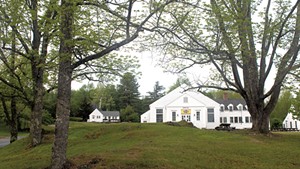

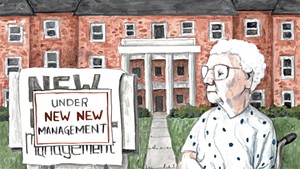
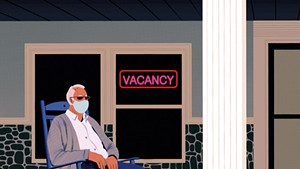









Comments
Comments are closed.
From 2014-2020, Seven Days allowed readers to comment on all stories posted on our website. While we've appreciated the suggestions and insights, right now Seven Days is prioritizing our core mission — producing high-quality, responsible local journalism — over moderating online debates between readers.
To criticize, correct or praise our reporting, please send us a letter to the editor or send us a tip. We’ll check it out and report the results.
Online comments may return when we have better tech tools for managing them. Thanks for reading.